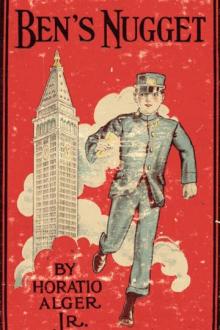Paul Prescott's Charge, Jr. Horatio Alger [popular romance novels TXT] 📗

- Author: Jr. Horatio Alger
Book online «Paul Prescott's Charge, Jr. Horatio Alger [popular romance novels TXT] 📗». Author Jr. Horatio Alger
Paul listened to this assertion with unutterable surprise.
“I am quite certain I bought it here,” said the woman, perplexed.
“Must have been the next store,—Blake & Hastings. Better go over there.”
The woman went out.
“That's the way to do business,” said Williams, winking at Paul.
Paul said nothing, but he felt more than ever doubtful about retaining his place.
XXII. MR. BENTON'S ADVENTURE.
One evening, about a fortnight after his entrance into Smith & Thompson's employment, Paul was putting up the shutters, the business of the day being over. It devolved upon him to open and close the store, and usually he was the last one to go home.
This evening, however, Mr. Nicholas Benton graciously remained behind and assisted Paul in closing the store. This was unusual, and surprised Paul a little. It was soon explained, however.
“Good-night, Nicholas,—I mean, Mr. Benton,” said Paul.
“Not quite yet. I want you to walk a little way with me this evening.”
Paul hesitated.
“Come, no backing out. I want to confide to you a very important secret.”
He looked so mysterious that Paul's curiosity was aroused, and reflecting that it was yet early, he took his companion's proffered arm, and sauntered along by his side.
“What's the secret?” he asked at length, perceiving that Nicholas was silent.
“Wait till we get to a more retired place.”
He turned out of Broadway into a side street, where the passers were less numerous.
“I don't think you could guess,” said the young man, turning towards our hero.
“I don't think I could.”
“And yet,” continued Benton, meditatively, “it is possible that you may have noticed something in my appearance just a little unusual, within the last week. Haven't you, now?”
Paul could not say that he had.
Mr. Benton looked a little disappointed.
“Nobody can tell what has been the state of my feelings,” he resumed after a pause.
“You ain't sick?” questioned Paul, hastily.
“Nothing of the sort, only my appetite has been a good deal affected. I don't think I have eaten as much in a week as you would in a day,” he added, complacently.
“If I felt that way I should think I was going to be sick,” said Paul.
“I'll let you into the secret,” said Mr. Benton, lowering his voice, and looking carefully about him, to make sure that no one was within hearing distance—“I'M IN LOVE.”
This seemed so utterly ludicrous to Paul, that he came very near losing Mr. Benton's friendship forever by bursting into a hearty laugh.
“I didn't think of that,” he said.
“It's taken away my appetite, and I haven't been able to sleep nights,” continued Mr. Benton, in a cheerful tone. “I feel just as Howard Courtenay did in the great story that's coming out in the Weekly Budget. You've read it, haven't you?”
“I don't think I have,” said Paul.
“Then you ought to. It's tiptop. It's rather curious too that the lady looks just as Miranda does, in the same story.”
“How is that?”
“Wait a minute, and I'll read the description.”
Mr. Benton pulled a paper from his pocket,—the last copy of the Weekly Budget,—and by the light of a street lamp read the following extract to his amused auditor.
“Miranda was just eighteen. Her form was queenly and majestic. Tall and stately, she moved among her handmaidens with a dignity which revealed her superior rank. Her eyes were dark as night. Her luxuriant tresses,—there, the rest is torn off,” said Mr. Benton, in a tone of vexation.
“She is tall, then?” said Paul.
“Yes, just like Miranda.”
“Then,” said our hero, in some hesitation, “I should think she would not be very well suited to you.”
“Why not?” asked Mr. Benton, quickly.
“Because,” said Paul, “you're rather short, you know.”
“I'm about the medium height,” said Mr. Benton, raising himself upon his toes as he spoke.
“Not quite,” said Paul, trying not to laugh.
“I'm as tall as Mr. Smith,” resumed Mr. Benton, in a tone which warned Paul that this was a forbidden subject. “But you don't ask me who she is.”
“I didn't know as you would be willing to tell.”
“I shan't tell any one but you. It's Miss Hawkins,—firm of Hawkins & Brewer. That is, her father belongs to the firm, not she. And Paul,” here he clutched our hero's arm convulsively, “I've made a declaration of my love, and—and——”
“Well?”
“She has answered my letter.”
“Has she?” asked Paul with some curiosity, “What did she say?”
“She has written me to be under her window this evening.”
“Why under her window? why didn't she write you to call?”
“Probably she will, but it's more romantic to say, 'be under my window.'”
“Well, perhaps it is; only you know I don't know much about such things.”
“Of course not, Paul,” said Mr. Benton; “you're only a boy, you know.”
“Are you going to be under her window, Nich,—I mean Mr. Benton?”
“Of course. Do you think I would miss the appointment? No earthly power could prevent my doing it.”
“Then I had better leave you,” said Paul, making a movement to go.
“No, I want you to accompany me as far as the door. I feel—a little agitated. I suppose everybody does when they are in love,” added Mr. Benton, complacently.
“Well,” said Paul, “I will see you to the door, but I can't stay, for they will wonder at home what has become of me.”





Comments (0)